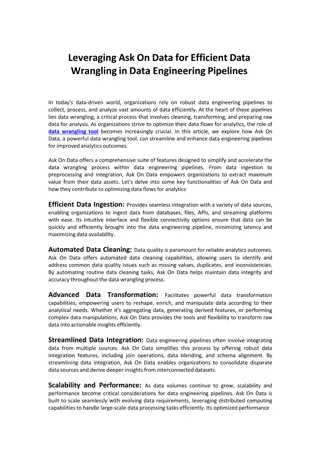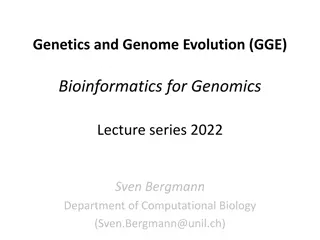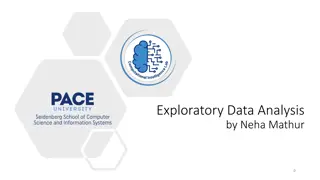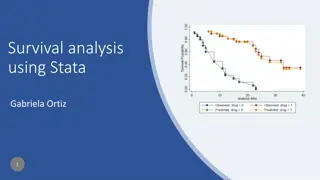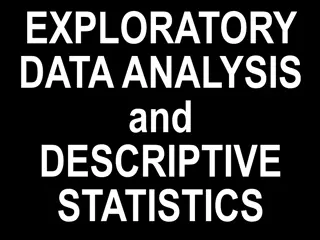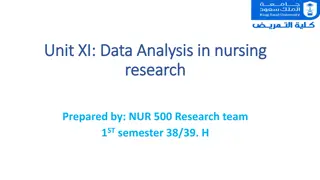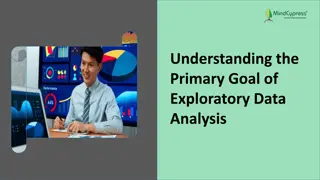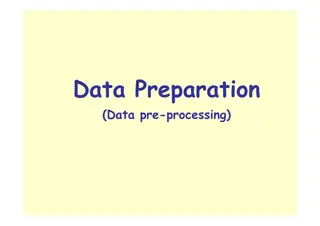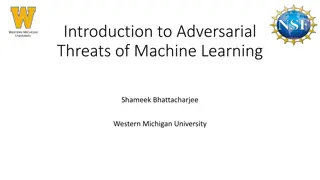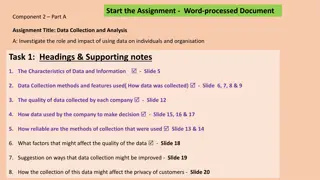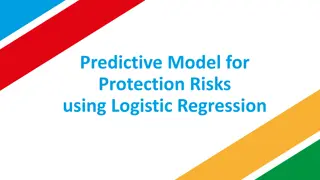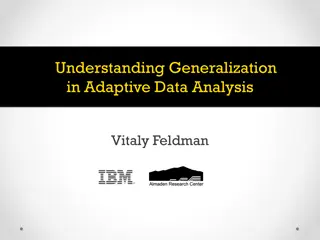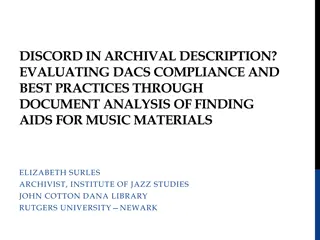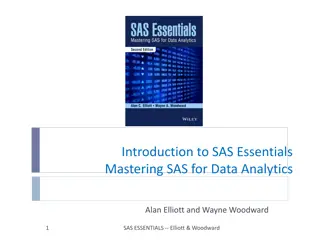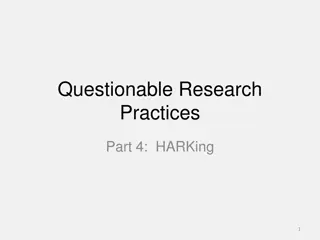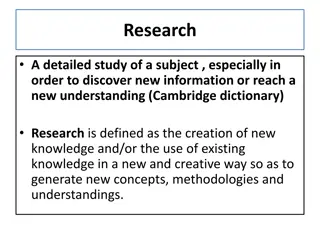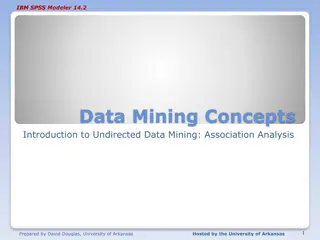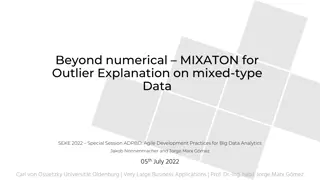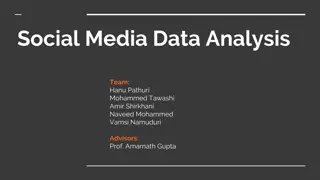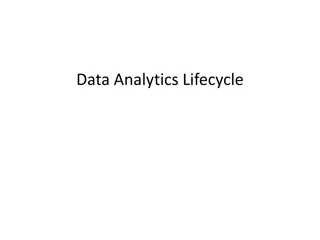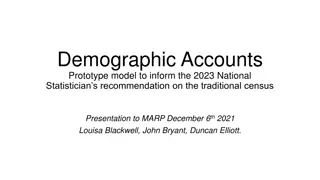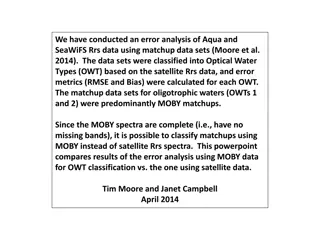Understanding Data Types and Summary Statistics in Exploratory Data Analysis
Data types, including discrete numerical, continuous numerical, ordinal, and nominal, are essential in exploratory data analysis. Variables can be categorized based on their nature, such as numerical variables (interval vs. ratio) and categorical data summaries. Learn about USGS flow measurements, n
4 views • 48 slides
NCI Data Collections BARPA & BARRA2 Overview
NCI Data Collections BARPA & BARRA2 serve as critical enablers of big data science and analytics in Australia, offering a vast research collection of climate, weather, earth systems, environmental, satellite, and geophysics data. These collections include around 8PB of regional climate simulations a
6 views • 22 slides
Interpretation
Interpretation in research methodology involves drawing inferences from collected data, establishing continuity in research, and developing explanatory concepts for future studies. It helps researchers understand abstract principles, make predictions, and maintain research continuity. Interpretation
4 views • 5 slides
Ask On Data for Efficient Data Wrangling in Data Engineering
In today's data-driven world, organizations rely on robust data engineering pipelines to collect, process, and analyze vast amounts of data efficiently. At the heart of these pipelines lies data wrangling, a critical process that involves cleaning, transforming, and preparing raw data for analysis.
2 views • 2 slides
Bioinformatics for Genomics Lecture Series 2022 Overview
Delve into the Genetics and Genome Evolution (GGE) Bioinformatics for Genomics Lecture Series 2022 presented by Sven Bergmann. Explore topics like RNA-seq, differential expression analysis, clustering, gene expression data analysis, epigenetic data analysis, integrative analysis, CHIP-seq, HiC data,
0 views • 36 slides
Understanding Exploratory Data Analysis (EDA) for Effective Data Insights
Exploratory Data Analysis (EDA) is a crucial approach for analyzing data by utilizing various techniques to extract insights, identify anomalies, and visualize trends. By leveraging EDA using tools like Pandas, researchers can improve their understanding of data variables, detect errors, and explore
2 views • 14 slides
Veterinary Surgical Procedures Overview
Veterinary surgical procedures such as spaying, neutering, exploratory surgeries, bladder stone removal, and surgical fracture repair are essential for maintaining the health and well-being of animals. Exploratory procedures help diagnose issues when other tests fail to reveal abnormalities, and sur
1 views • 31 slides
Qualitative Data Analysis Techniques in Research
The purpose of data analysis is to organize, structure, and derive meaning from research data. Qualitative analysis involves insight, creativity, and hard work. Researchers play a crucial role as instruments for data analysis, exploring and reflecting on interview discussions. Steps include transcri
1 views • 27 slides
Survival Analysis Using Stata - Overview and Data Examination
This content discusses survival analysis using Stata, covering topics such as survival-time data, exploratory graphs, estimation, models, predictions, diagnostics, testing assumptions, and more. It explains how survival-time data is measured and discusses various examples and scenarios related to su
0 views • 83 slides
Understanding Interviews: Construction, Types, and Methodologies
Interviews are essential for collecting data in exploratory research. This content elaborates on the construction, types, and methodologies of interviews, including unstructured and structured approaches. Tips for minimizing bias, training interviewers, and the benefits of face-to-face interviews ar
0 views • 50 slides
Understanding the Process and Types of Research Design
The process of research design involves interactive stages occurring simultaneously, leading to the creation of a structured study. There are three main types of research design: exploratory, descriptive, and experimental (or causal). Each type has its own objectives and methods. Exploratory researc
0 views • 7 slides
Understanding Data Governance and Data Analytics in Information Management
Data Governance and Data Analytics play crucial roles in transforming data into knowledge and insights for generating positive impacts on various operational systems. They help bring together disparate datasets to glean valuable insights and wisdom to drive informed decision-making. Managing data ma
0 views • 8 slides
Understanding Research Methods: Quantitative, Qualitative, and Mixed Approaches
This introduction provides an overview of qualitative, quantitative, and mixed methods research, highlighting key differences and various types of research approaches. It delves into exploratory, descriptive, and causal research methodologies, offering insights into problem discovery, data collectio
0 views • 50 slides
Workshop on Data Analysis in Business and Law at University of Nigeria, Nsukka
This workshop at the University of Nigeria, Nsukka focuses on data analysis in business and law, covering topics such as measurement, scaling, data preparation, analysis, and interpretation. Participants will learn about the importance of data integrity, statistical tools, and the benefits of ICT in
4 views • 21 slides
Exploratory Data Analysis and Descriptive Statistics in Statistical Analysis
Exploratory Data Analysis involves understanding data characteristics through visualization techniques like bar graphs, pie charts for qualitative data and histograms, scatterplots for quantitative data. It includes calculating mean, median for center, range, standard deviation for spread, and ident
0 views • 7 slides
Understanding Data Analysis in Nursing Research
Data analysis in nursing research involves rendering individual data points into meaningful information, leading to knowledge generation. The process includes qualitative and quantitative analysis to organize and interpret data effectively. Techniques such as data reduction, data display, and conclu
2 views • 26 slides
Understanding the Primary Goal of Exploratory Data Analysis
Exploratory data analysis (EDA) is a crucial step in the data science process. Scientists and data analysts use it to evaluate and condense datasets in order to find trends, identify anomalies, and test theories.
1 views • 13 slides
Importance of Data Preparation in Data Mining
Data preparation, also known as data pre-processing, is a crucial step in the data mining process. It involves transforming raw data into a clean, structured format that is optimal for analysis. Proper data preparation ensures that the data is accurate, complete, and free of errors, allowing mining
1 views • 37 slides
Understanding Adversarial Threats in Machine Learning
This document explores the world of adversarial threats in machine learning, covering topics such as attack nomenclature, dimensions in adversarial learning, influence dimension, causative and exploratory approaches in attacks, and more. It delves into how adversaries manipulate data or models to co
0 views • 10 slides
Developing a New Measure of Relationship Maintenance in the Facebook Age
This study focuses on the development and validation of a new measure of relationship maintenance in the context of Facebook. It addresses the limitations of existing measures that emphasize strong-tie relationships and collocation, which may not apply to the diverse nature of Facebook connections.
0 views • 18 slides
Understanding Data Collection and Analysis for Businesses
Explore the impact and role of data utilization in organizations through the investigation of data collection methods, data quality, decision-making processes, reliability of collection methods, factors affecting data quality, and privacy considerations. Two scenarios are presented: data collection
1 views • 24 slides
Data Analysis and Passage Analysis Project Proposal
This project proposal by Anthony Yang focuses on developing a Java program for data analysis and passage analysis. The motivation behind the project is to gain more knowledge in computer science and statistics-related topics while utilizing technology to extract useful insights from data. The propos
0 views • 8 slides
Predictive Model for Protection Risks Using Logistic Regression
Utilizing logistic regression, a statistical modeling technique, to predict protection risks on freedom of movement in Afghanistan. The analysis involves exploratory data examination, correlation matrices, and predictor variable assessment to identify factors influencing the outcome variable. Insigh
2 views • 20 slides
Understanding Generalization in Adaptive Data Analysis by Vitaly Feldman
Adaptive data analysis involves techniques such as statistical inference, model complexity, stability, and generalization guarantees. It focuses on sequentially analyzing data with steps like exploratory analysis, feature selection, and model tuning. The approach emphasizes on avoiding hypothesis te
0 views • 25 slides
Former Exploratory Students' Tips for Finding the Best Fit at GV!
Explore what tips and resources former exploratory students have utilized to find their best fit at Grand Valley State University (GV). Discover insights on majors declared, including Criminal Justice, Political Science, Wildlife Biology, and more. Gain valuable information on navigating as a transf
0 views • 28 slides
Evaluating DACS Compliance in Archival Music Collections
This research focuses on evaluating DACS compliance and best practices through document analysis of finding aids for music materials. Elizabeth Surles, an archivist at the Institute of Jazz Studies, explores the challenges in describing music archives and the impact of musical style on documentation
0 views • 21 slides
Mastering SAS for Data Analytics - Factor Analysis Essentials
Factor analysis is a dimension reduction technique used to identify latent variables from observed data. Exploratory factor analysis involves steps like computing correlations, extracting factors, rotating factors for interpretation, and computing factor scores. SAS PROC FACTOR is commonly used for
1 views • 34 slides
Understanding HARKing and the Importance of Exploratory vs. Confirmatory Research
HARKing (Hypothesizing After the Results are Known) involves presenting unexpected findings as if they were predicted and treating exploratory work as confirmatory. Exploratory research allows for hypothesis generation, while confirmatory research focuses on hypothesis testing. It is crucial to diff
0 views • 17 slides
Understanding the Purpose of Research: Exploratory, Descriptive, and Explanatory Studies
Research is a systematic inquiry process that involves data collection, critical information documentation, analysis, and interpretation. It serves three main purposes: exploratory research to explore questions, descriptive research to expand knowledge on current issues, and explanatory research to
0 views • 14 slides
Classifying Entities into an Incomplete Ontology: Exploratory EM Approach
The research discusses methods for hierarchical classification of entities into incomplete ontologies. It explores the challenges of evolving web-scale datasets and the need for classifying entities in an incomplete ontology structure. The Hierarchical Exploratory EM model is detailed, providing ins
0 views • 27 slides
Introduction to IBM SPSS Modeler: Association Analysis and Market Basket Analysis
Understanding Association Analysis in IBM SPSS Modeler 14.2, also known as Affinity Analysis or Market Basket Analysis. Learn about identifying patterns in data without specific targets, exploring data mining in an unsupervised manner. Discover the uses of Association Rules, including insights into
0 views • 18 slides
Beyond Numerical MIXATON for Outlier Explanation on Mixed-Type Data SEKE 2022 Special Session ADPBD
This presentation delves into outlier detection in mixed-type data, exploring approaches, evaluation methods, and conclusions. Motivated by the need for detailed outlier explanations, it discusses deep learning ensemble techniques and the challenges of understanding why certain data points are flagg
0 views • 31 slides
Explore Twitter Data Analysis Project - Discovering Trends and Insights
The Social Media Data Analysis Team led by Hanu Pathuri and Mohammed Tawashi is focused on conducting exploratory analysis of Twitter data with media. By analyzing the vast amount of data available on Twitter, the team aims to uncover interesting facts, trends, and patterns. They are investigating h
0 views • 47 slides
Vocational Exploratory Program 2023-24 - Career Interest Assessment and Guidance
Engage in the Vocational Exploratory Program for the 2023-24 school year to understand your career interests through activities like the Career Interest Profiler. Explore various aspects of your personality and work preferences without being confined to a specific career choice. Utilize tools like N
0 views • 24 slides
Exploratory Freshman & Conditional Admission Proposals Overview
The Academic Standards Committee at Auburn University developed two proposals in response to the 2013-2018 strategic plan's objectives, focusing on promoting academic success and enhancing freshmen programs. Ad hoc committees formed recommendations, leading to the submission of specific exploratory
0 views • 12 slides
Overview of Data Analytics Lifecycle and Key Stakeholders in Projects
Understanding the Data Analytics Lifecycle is crucial for data science projects, which are exploratory in nature and involve phases like discovery, data preparation, model planning, execution, results communication, and operationalization. The lifecycle is designed for Big Data challenges with itera
0 views • 23 slides
Center for Exploratory Studies - Academic Programs and Resources
Center for Exploratory Studies offers a range of academic programs and resources for students exploring their educational paths. Learn about FERPA guidelines, student commitment, advising models, types of exploratory students, and more. Explore major exploration resources, course schedule samples, a
0 views • 12 slides
Enhancing Demographic Accounts for Informed Decision-Making
The presentation discusses the prototype model for demographic accounts to inform the 2023 National Statistician's recommendation on the traditional census. It delves into the limitations of the current system, the structure of demographic accounts, advantages and disadvantages, exploratory analysis
0 views • 29 slides
Comparison of Aqua and SeaWiFS Rrs Data Error Analysis Using MOBY Data
An error analysis was conducted on Aqua and SeaWiFS Rrs data using matchup data sets classified into Optical Water Types (OWT). The analysis compared results of OWT classification using MOBY data versus satellite data, highlighting differences in error metrics such as RMSE and Bias. Aqua and SeaWiFS
1 views • 12 slides
Understanding Latent Variable Modeling in Statistical Analysis
Latent Variable Modeling, including Factor Analysis and Path Analysis, plays a crucial role in statistical analysis to uncover hidden relationships and causal effects among observed variables. This method involves exploring covariances, partitioning variances, and estimating causal versus non-causal
0 views • 59 slides



